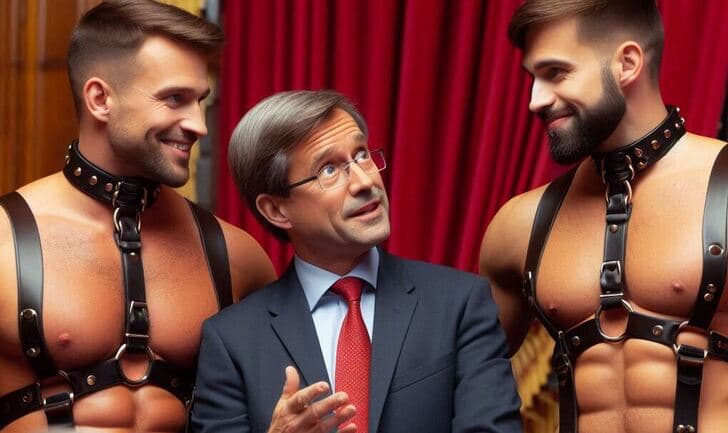You know what's wild? I was at Pride last month and saw this older guy in leather holding a "Drop the T" sign while a bunch of twenty-somethings marched past him screaming about trans liberation.
The whole thing made me think about something most people don't see coming - this massive generational war happening right inside our own spaces. Gay Boomers who literally survived AIDS and police raids are getting called problematic by the very kids who benefit from everything the older guys fought for.
The irony hits hard when you realize the generation that built modern gay rights now gets lectured about being too narrow and too focused on fitting in by people who've never lived without marriage equality.
The Assimilation Divide: When Liberation Becomes Respectability
Here's the thing that blows my mind - gay Boomers spent their whole lives fighting just to be treated like normal people, and now younger queers are telling them that normal is actually the enemy. Think about how backwards that sounds when you really examine it.
Guys who risked getting arrested for holding hands now watch college kids trash marriage equality as some kind of heteronormative oppression. The split goes way deeper than just disagreeing about stuff - it's really about what freedom actually means, isn't it?
The Marriage Wars: From Forbidden Dream to Oppressive Institution
Let me tell you why marriage hits so differently for older gay men - they watched friends die alone in hospitals because they had zero legal rights. Back in the seventies and eighties, you couldn't make medical decisions for your partner or even inherit his apartment when he died.
Marriage wasn't just some romantic ideal - it meant survival, protection, and basic human dignity when society treated you like a criminal just for existing.
But here's what younger queers see when they look at marriage equality - a trap that forces everyone into heteronormative boxes while leaving out polyamorous people and chosen families. The criticism goes deeper than just being anti-establishment rebels.
Many argue that marriage equality actually hurt queer liberation because it made everyone focus on respectability instead of real change. Why should we copy straight nuclear families when we could create something completely different?
The Corporate Pride Paradox: Celebration or Commodification?
When older gay men see rainbow logos on bank branches and airline ads, they remember when those same companies would fire you just for being gay. Corporate sponsorships make it like validation and proof that society finally accepts us.
Major corporations dropping millions on Pride events shows how far we've come from the days when being gay meant career suicide - that's real progress you can measure.
But Gen Z queers look at corporate Pride and see companies using rainbow marketing while donating to anti-LGBTQ politicians behind the scenes. The whole thing feels like pink-washing - taking our symbols and selling them back to us while maintaining discriminatory policies in other countries.
Chase Bank sponsors a Pride float while funding legislators who vote against trans rights? That's not progress, that's exploitation.
The Identity Expansion Wars: When Letters Become Battlegrounds
Watch what happens when someone tries to expand the acronym from "gay" to "LGBTQIA+" - you'll see more than just language changing. You'll see two completely different visions of what the movement should be.
Older gay men get frustrated with what feels like mission creep, arguing that adding more identities makes everything unfocused and creates internal fighting. Younger activists fire back that expansion just reflects reality - gender and sexuality are way more diverse than anyone thought.
The real fight is about whether we should build big coalitions or stay focused on specific goals.
The Pronoun Revolution: Grammar as Political Battlefield
Here's what drives older gay men crazy about pronoun introductions at meetings - it feels like performative theater instead of real political work. These guys fought actual legal battles for basic recognition, and now they're navigating complex etiquette around xe/xir pronouns and constant identity declarations.
The whole emphasis on language feels disconnected from material struggles when being gay meant losing your job, your home, and your family.
But younger queers frame pronoun usage as basic respect for trans and non-binary people who face incredible violence and discrimination. Using someone's correct pronouns does multiple things - it normalizes gender diversity, creates safer spaces, and shows you're an ally to vulnerable people.
When older guys resist pronouns, it reads as straight-up transphobia to activists who see gender liberation as part of the same fight.
The Kink Visibility Debate: Public Expression or Private Practice?
Here's the ironic part about kink visibility debates - gay Boomers who went to early Pride events remember when leather daddies and drag queens were the most visible people in the movement. The same men who normalized public gay sexuality now argue for discretion and family-friendly Pride events.
The shift toward respectability reflects decades of calculating how to win mainstream acceptance and social integration.
Younger activists argue that sanitizing Pride erases the sexual liberation roots of the movement while reinforcing shame around non-normative desires. Making Pride family-friendly gets criticized as throwing kinky queers under the bus for straight comfort.
Puppy play, leather gear, and explicit sexuality represent authentic queer expression, not inappropriate public behavior - at least in this generational worldview.
The Privilege Perception Gap: Oppression Olympics and Generational Trauma
You want to see real tension? Watch what happens when gay Boomers who survived the AIDS crisis get told they need to examine their privilege. Men who watched hundreds of friends die feel completely invalidated when younger queers start talking about intersectionality and checking advantages.
The whole thing creates bitter conflicts that seem impossible to resolve. Meanwhile, younger queers argue that surviving oppression doesn't give you a free pass to perpetuate other forms of discrimination, right?
The AIDS Memorial Divide: Sacred History or Exclusionary Narrative?
AIDS commemoration events usually center gay male experiences while marginalizing how the crisis affected trans women, lesbians, and people of color. Older gay men guard the memory of lost lovers and chosen families with fierce protectiveness - any criticism of AIDS narratives feels like disrespecting the dead.
The emotional investment in preserving specific historical accounts makes discussions of intersectionality feel like attacks on sacred ground.
Younger activists push for AIDS storytelling that acknowledges how racism, transphobia, and misogyny shaped who received care and who got forgotten. Trans women of color died in disproportionate numbers but rarely show up in mainstream AIDS memorials or history books.
Expanding the narrative beyond white gay male experience honors all victims while giving future generations more accurate historical records.
The Coming Out Hierarchy: Individual Stories or Collective Strategy?
Personal coming out stories hold deep meaning for gay Boomers who risked everything to live authentically in hostile environments. Each individual story represents courage, sacrifice, and hard-won self-acceptance that deserves respect and recognition.
The emphasis on personal journeys reflects lived experience of isolation and the life-changing power of finding authentic self-expression despite serious social consequences.
Gen Z queers critique coming out culture as too individualistic, focusing on personal revelation instead of collective liberation. The whole framework assumes that visibility automatically creates progress while ignoring how coming out remains impossible for many people due to economic vulnerability, family rejection, or physical safety concerns.
Celebrating disclosure over material change reinforces inequality between people who have safe coming out options and those who don't.
The Political Strategy Schism: Incremental Reform or Revolutionary Change
The generational divide over political tactics reflects completely different theories about how social change happens and different relationships to existing power structures. Gay Boomers achieved marriage equality through careful court cases and electoral politics - they believe in working within the system for gradual progress.
Younger queers influenced by intersectional feminism and anti-capitalist analysis view incremental reform as inadequate for addressing systemic oppression. The strategic disagreement goes beyond tactics to fundamental questions about whether existing institutions deserve reform or replacement.
The Electoral Engagement Paradox: Voting Rights or Voting Futility?
Democratic Party loyalty among gay Boomers reflects practical politics based on clear policy differences between parties on LGBTQ issues. Men who lived through Republican administrations that ignored AIDS while promoting anti-gay constitutional amendments understand electoral consequences in gut-wrenching ways.
Voting Democratic represents harm reduction and incremental progress, not ideological alignment with party positions on other issues.
Younger queers express deep skepticism about electoral politics while demanding more radical positions from Democratic candidates on issues like police abolition and wealth redistribution. The critique extends beyond individual politicians to question whether electoral systems serve queer liberation when they operate within capitalist structures that create inequality.
Voting becomes insufficient without addressing root causes of oppression through systemic change.
The Protest Methodology Clash: Respectability or Disruption?
Permitted marches and lobbying meetings represent effective advocacy to gay Boomers who remember when police arrested people simply for gathering in gay bars. Legal demonstrations with proper permits and professional organizers demonstrate social progress and political sophistication compared to earlier eras of criminalized resistance.
Working within established protest frameworks shows respect for democratic processes and builds broader coalitions.
Direct action and civil disobedience appeal to younger activists who view polite protest as ineffective theater that maintains rather than challenges power structures. Blocking traffic, occupying buildings, and confronting politicians directly creates urgency and disruption that generates media attention and political pressure.
The emphasis on disruption reflects analysis that comfortable protest allows systems to ignore demands while appearing to respect dissent.
The Digital Generation Gap: Online Activism and Real-World Results
Social media activism creates unprecedented opportunities for organizing and education while simultaneously enabling call-out culture and performative politics that frustrate older activists. Gay Boomers who organized through phone trees and photocopied flyers view Twitter activism with suspicion, questioning whether online engagement translates into material change.
The digital divide reflects different understandings of how social movements create lasting transformation, doesn't it?
The Call-Out Culture Controversy: Accountability or Destruction?
Public criticism on social media platforms allows younger activists to hold older gay men accountable for problematic statements and behaviors in ways that were impossible before digital communication. Screenshots and viral threads create permanent records of offensive comments while enabling rapid response to harmful actions.
The democratization of accountability challenges traditional power structures within LGBTQ organizations and social networks.
Gay Boomers experience call-out culture as destructive purity testing that destroys relationships and discourages honest dialogue about difficult topics. Men who spent decades building gay institutions watch younger activists tear down leaders over single statements or old social media posts.
The emphasis on perfect political positions creates environments where people avoid engagement rather than risk public shaming for imperfect expressions.
The Influencer Economy: Visibility or Commercialization?
Social media influencers with large followings create new forms of LGBTQ representation and economic opportunity that didn't exist in previous generations. Young queer content creators build careers around identity performance while educating audiences about sexuality and gender diversity.
The platforms enable authentic self-expression and community building that transcends geographic limitations of traditional gay neighborhoods.
Older gay men question whether influencer culture commodifies queer identity while promoting individualistic rather than collective approaches to liberation. The emphasis on personal branding and follower counts transforms political identity into marketing opportunity.
Monetizing queerness through sponsored content and product placement creates conflicts between authentic expression and profitable performance that earlier generations never faced.
Look, the generational war within queer spaces reveals fundamental tensions about where LGBTQ movements should go and what liberation actually means. Gay Boomers who built the foundation for current freedoms find themselves defending achievements that younger activists see as insufficient or even harmful.
Meanwhile, Gen Z queers push for more radical visions that older generations view as unrealistic or destructive to hard-won progress. The most surprising part of this whole conflict isn't the disagreements themselves - it's how both generations struggle to see the validity in each other's experiences and strategies.
That leather daddy holding the "Drop the T" sign and the young activist chanting for trans liberation are both fighting for queer freedom - they just disagree about what freedom looks like and how to get there.





